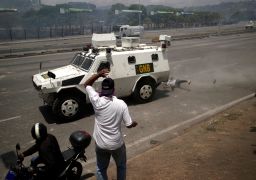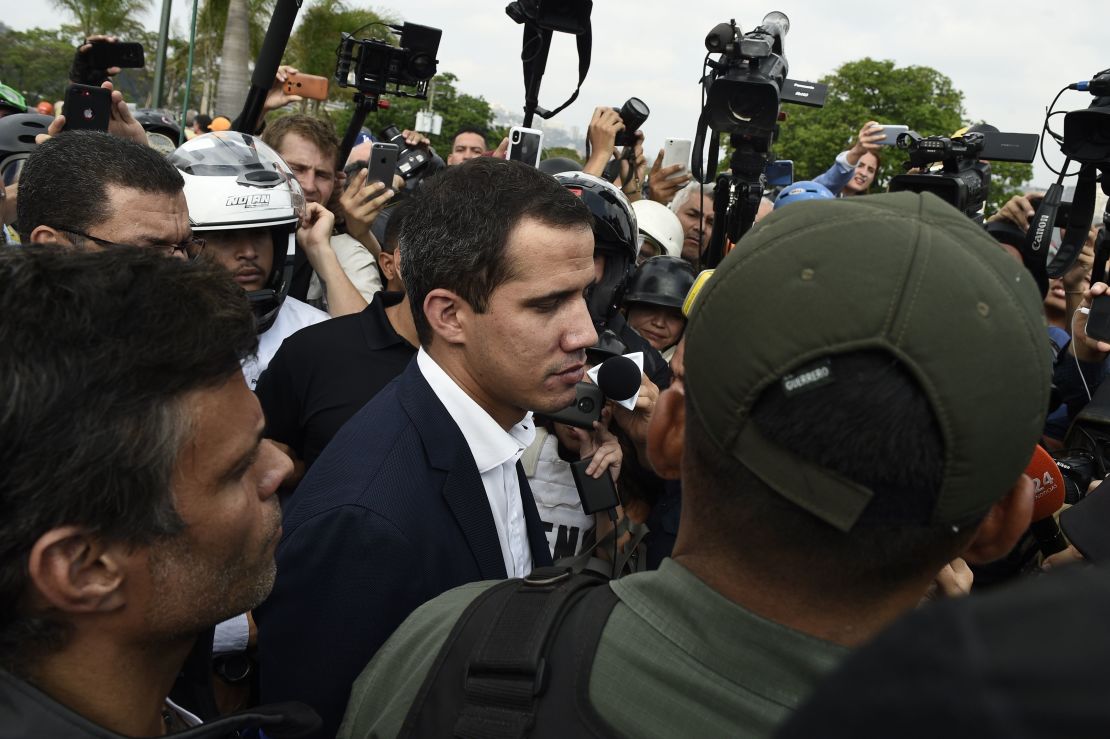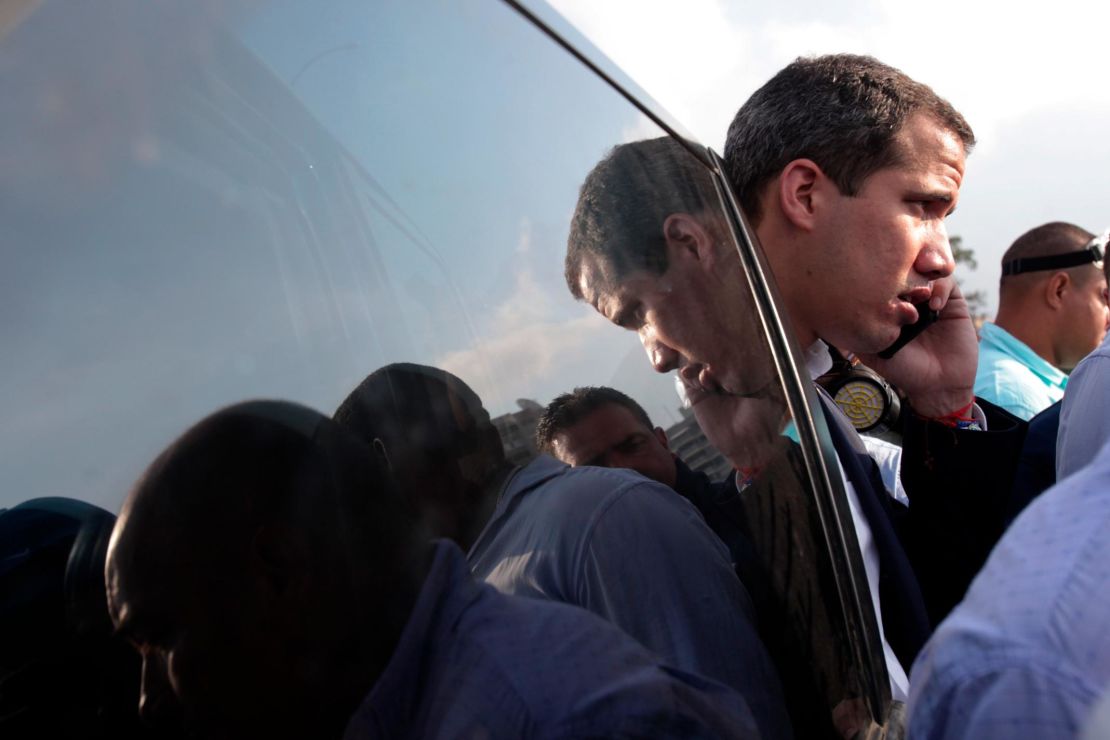Venezuelan opposition leader Juan Guaido made his boldest attempt yet to seize power from embattled President Nicolas Maduro on Tuesday morning, announcing an uprising alongside a group of soldiers in the capital Caracas.
His call brought protesters to the city’s La Carlota military airbase, where there were confrontations between Guaido’s military supporters and Maduro regime loyalists under a cloud of tear gas as gun shots rang through the air. Some members of the military, national guard, and armed forces brandished blue armbands in apparent solidarity with the opposition.
In live agency video from the ground, opposition protesters appeared to be throwing objects at military vehicles immediately before one plowed straight into the crowd, knocking a number of people down.

More than 70 people who were injured in the clashes have been taken to Salud Chacao Medical Center in Caracas, according to the hospital’s president. Of the injured, 42 were wounded with rubber bullets and two were treated for gunshot wounds. According to Venezuela’s Minister of Defense Vladimir Padrino, a military colonel was also shot during clashes.
Juan Guaido’s “final phase”
The unrest started with a dawn address, in which Guaido declared he was “beginning the final phase of Operation Freedom,” an escalation of his bid to oust Maduro, which started in January. He was flanked by men in military fatigues and armored vehicles.
Guaido, who had previously called for nationwide demonstrations on May 1, leads Venezuela’s National Assembly and has been recognized as the nation’s interim president by dozens of other countries. He has led months of protest against the government, but his April 30 speech marked his most successful attempt yet to involve the military in the removal of the Venezuelan leader.

Speaking alongside opposition figure Leopoldo Lopez – apparently freed from house arrest by defecting soldiers – Guaido declared the “start of the end of the usurpation” in a video filmed outside La Carlota military airbase in Caracas early on Tuesday.
Later that day, Lopez and his family “entered as guests” the Chilean diplomatic mission’s residence in Caracas, according to the tweet from the Chilean Ministry of Foreign Affairs.
Venezuela’s Information Minister Jorge Rodríguez called Guaido’s action an attempted “coup” on Twitter – a term which Guaido rejects – and noted that the government would “deactivate” “a small number of traitorous military personnel.”
Maduro himself responded to the unrest in a tweet, saying that regional defense bodies had expressed “total loyalty” and calling on the public to rally in support of the government, but he made no public appearances.
Military involvement
It is unclear whether Guaido’s move will gain traction or how much military support he has. “The situation is under control,” Maduro’s Communications Vice Minister Isbemar Jimenez told CNN on Tuesday. “All military garrisons support Venezuelan President Nicolas Maduro.”
But Guaido’s representative in the US told CNN that the opposition leader has the support of the “middle and lower ranks” of the military.
“What you have seen is only a statement from the privileged elite of the army force. We have the support of the middle and lower ranks,” diplomat Carlos Vecchio told CNN’s Christiane Amanpour.
He also confirmed that Guaido’s side has not had any negotiations with Maduro. “The only negotiation that we could have is just the exit of Maduro,” he said. “The day and the hour and how.”
International reaction
As Guaido’s supporters massed around La Carlota airbase, the United States Secretary of State Mike Pompeo said in a tweet that the American government “fully supports” the operation launched by the opposition leader.
Pompeo later told CNN that Maduro had been preparing to depart to Cuba that morning, before being talked out of it by Russia. However, his claim has been refuted by Russian Foreign Ministry spokeswoman Maria Zakharova, who told CNN: “Washington tried its best to demoralize the Venezuelan army and now used fakes as a part of information war.”
US president Donald Trump also tweeted about the protests, and US Senator Marco Rubio, a vocal critic of Maduro, urged Venezuela’s military to support Guaido on Twitter.
Brazil’s far-right President Jair Bolsonaro also tweeted his support for Guaidó, and Brazilian Vice President Hamilton Mourão told press that the political standoff had become a “no turning back” moment.
“Guaidó and Leopoldo Lopez are in a situation where there is no turning back. After this point, they will either be arrested or Maduro will leave,” Mourão said.
Colombia President Ivan Dunque called on Venezuelans and the military to “be on the right side of history, rejecting dictatorship and usurpation of Maduro.”
Ecuador’s Foreign Minister José Valencia also tweeted the government’s “strong support” of Guaido.
Meanwhile, Cuban and Russian officials have rejected the opposition movementt. And Mexican President Andrés Manuel López Obrador said he retains his neutral position on Venezuela.

Guaido emerged from obscurity when he was named president of the National Assembly on January 5. His arrival to the political scene has re-energized opposition to Maduro’s government, which foreign powers and domestic rivals say was returned to power in a sham election last year.
He has promised a transitional government and free elections to end the rule of the socialist Maduro regime, which has overseen the once-wealthy oil nation’s descent into economic collapse and a humanitarian crisis.
After Guaido declared himself acting president in January, Maduro’s administration repeatedly blamed the US of orchestrating a coup to remove him.
The president has denied a humanitarian crisis exists in the country – refusing to accept much-needed foreign aid, while also blaming blackouts on a terror attack and American sabotage.
CNN’s Rob Picheta and Vasco Cotovio contributed to this report.
























